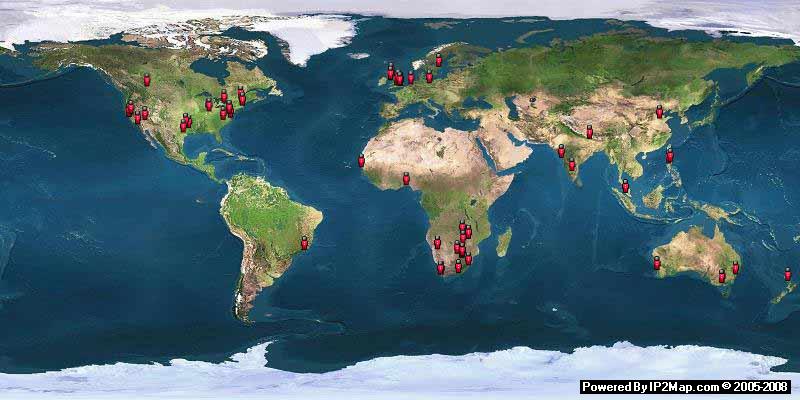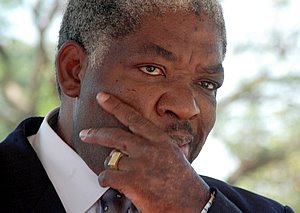Some papers surviving crackdown on dissent
Sun Foreign Reporter
Originally published April 30, 2007
JOHANNESBURG, South Africa // It was an error that would have chagrined most newspapers. But editors at Zimbabwe's weekly Standard felt another emotion - fear - when an article this year misstated the type of fancy Mercedes-Benz delivered to the central bank governor.
The bank threatened to go to the Media and Information Commission, which licenses newspapers, recalled Deputy Editor Bill Saidi. He worried that the commission might use that "falsehood" to close the newspaper, just as it had shut down three others in recent years for running afoul of Zimbabwe's draconian press laws.
"We do make the occasional mistake," Saidi said in an interview, "but what's terrible about the situation here is they consider it a crime. And for that, you can actually get banned."
| |
The Standard survived the car gaffe and continues to publish, conscious that the plug could be pulled anytime. It and a sister business paper, the Zimbabwe Independent, are among the last independent news sources left in Zimbabwe, where the repressive regime of President Robert G. Mugabe has moved to silence dissent as the country plunges ever deeper into economic meltdown.
There are various theories for why the government has let The Standard operate. Those include its small circulation of 23,000 and a possible desire by authorities to use it as evidence of supposed press freedoms. The chairman of the media commission, reached in the capital, Harare, would not answer questions over the telephone.
Whatever the case, the result is a situation where parallel realities are presented for Zimbabweans to consider.
According to state media (most newspapers, all television, all radio), Zimbabwe's woes are the work of a fire-bombing opposition and meddling by Britain and the United States, which are overly concerned with evicted white farmers.
But every Sunday, The Standard paints a different picture: That Mugabe's ruling party has brought on the southern African country's slide from prosperity to poverty through self-serving, corrupt policies, and that it now uses state violence to suppress calls for change.
In the past, reporters have been arrested for writing that Mugabe "commandeered" a jet of the national Air Zimbabwe for personal purposes. And since 2002, all newspapers must obtain a government license or face criminal charges; individual journalists must be registered.
Given the climate, the newspaper's pointed critiques of Mugabe's 27-year-old regime have been remarkable, media observers say. "I think it's heroic that they're publishing that kind of stuff in this environment," said Joel Simon, executive director of the Committee to Protect Journalists in New York.
In late March, freelance cameraman Edward Chikomba was abducted by armed men and killed, reportedly after video he shot of police brutality made it out of Zimbabwe and onto international airwaves. Simon has written to the Zimbabwean police asking that Chikomba's death and the beatings of three other journalists (none from The Standard's staff) be investigated.
At The Standard, Saidi received a bullet and threatening note in the mail after a January article detailed the desertion of soldiers from Zimbabwe's army. He also found a nail suspiciously embedded in one of his car's tires and says he constantly checks to see if he is being followed.
Yet he has not been tempted to quit. "So far, nothing has deterred me; I don't think anything will," he said. "We owe it to the country to tell the other side of the story, as it were."
The Sunday Mail bills itself as "the most widely read family newspaper." Although it is not clear how many copies are printed, the government-controlled paper circulates widely. It is the sister paper of The Daily Herald. The twice-as-expensive Standard circulates mainly in Harare. And with its price rising to the equivalent of about 70 cents in U.S. currency to keep up with runaway inflation, few ordinary Zimbabweans can afford The Standard.
On April 22, The Sunday Mail reported that a house at the Glen Norah police camp was bombed "by suspected MDC supporters in yet another round of unprovoked attacks on the law enforcement agents." MDC stands for the Movement for Democratic Change, the main but fractured opposition party.
No one was hurt, the article reported. A police superintendent said it was the 11th "terror bomb" in a month and that "thugs and people bent on causing mayhem in the country are at work."
Also on the front page was an article about a deal with China to give Zimbabwe farm equipment worth $25 million in return for tobacco. A photo showed a grinning Mugabe, 83, and a Chinese official holding an oversized yellow key. The article noted that Mugabe's "Look East" policy was "bearing fruit."
The same day's Standard did not report on any bombing or the China deal. Its front page had two other articles. The first, "Police intensify MDC repression," stated that police had "continued abductions and arrests of opposition MDC activists in a purge apparently ordered by a desperate government ahead of next year's elections."
That bylined article said that an MDC official was abducted from his home and that two others with opposition ties were arrested. An MDC lawyer said police had confirmed the arrests but would not tell him where the activists were being held or give other details.
The other article quoted unnamed "ruling party sources" to portray divisions within the Zanu PF party on Mugabe's stated intentions to stand for re-election next year. The lone person quoted by name was the minister of information and publicity, who confirmed only that Mugabe's Cabinet had sent proposed electoral changes back to Zanu PF's central committee for further discussion.
The differences between the papers extend to the opinion pages. The Sunday Mail printed a letter to the editor under the heading, "Criticism levelled against President unwarranted." On the same page was an essay by Tafataona Mahoso - executive chairman of the Media and Information Commission - railing against the limited sanctions imposed by "Britain and their white racist allies."
Meanwhile, in The Standard, Saidi wrote a withering column titled "Nation of bashers, bashees, eunuchs." Bashers are Mugabe allies who think "any citizen who doesn't subscribe to this doctrine deserves to be bashed, which can be broken down into a thorough beating, imprisonment without trial and death."
The bashee, he wrote, "is likely to be a citizen who demands accountability from the government," while eunuchs are "politically castrated" wealthy individuals who eschew politics and focus on making more money.
Another column ran under the headline, "The godfathers of the Zanu PF Mafia."
The publisher of The Standard and the Zimbabwe Independent, Trevor Ncube, said his staff tries hard to avoid breaking any laws, mainly by being accurate. Still, he cannot say for sure why his papers have not been shuttered. (One other independent paper exists: The Zimbabwean, which is printed outside Zimbabwe and trucked in weekly.)
"I'm a devout Christian, and I believe it is by the grace of God; nothing else would explain it," Ncube said at the Johannesburg office of a South African newspaper he also runs. "They see me as an enemy of the state, sponsored by the British government."
Attempts to contact The Sunday Mail were unsuccessful. Repeated phone calls did not go through, and an e-mail went unanswered.
At the Media and Information Commission, Mahoso declined to comment by phone, saying, "It's difficult these days to carry out interviews over the phone. You don't actually know who is on the other side."
Yahoo! Answers - Got a question? Someone out there knows the answer. Try it now.











No comments:
Post a Comment